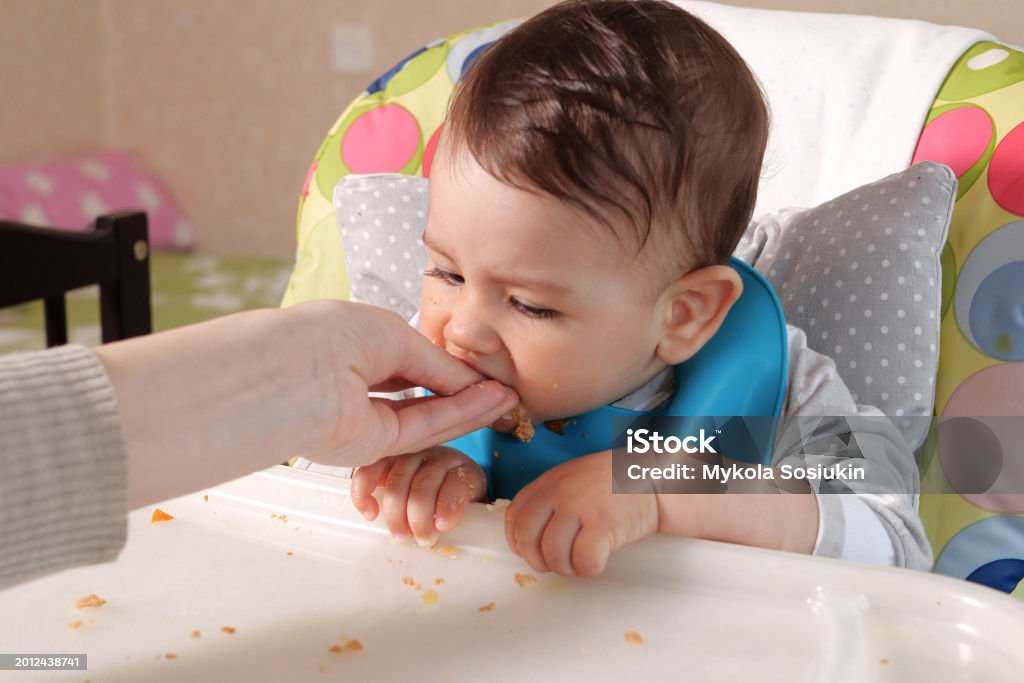Introducing solid foods to your baby is exciting, but it can also be a time filled with questions and uncertainties. How do you know when your baby is ready? What should you start with? And how does this new phase affect breastfeeding?
When to Start Solids
Health experts recommend exclusive breastfeeding for the first six months of life. After this period, you can begin introducing solid foods while continuing to breastfeed. Every baby is different, but there can be some signs that your baby may be ready for solids. It’s important to note that these signs usually appear around six months, but some babies might be ready a bit earlier or later. These include:
- Sitting up with minimal support.
- Showing interest in food when others are eating.
- Ability to hold their head steady.
- Loss of the tongue-thrust reflex (the reflex that pushes food out of the mouth).
Breastfeeding and Solid Foods: A Balanced Approach
Breast milk or formula should still be the primary source of nutrition during the first year. When you start solids, think of them as an addition, not a replacement. Breastfeeding continues to provide essential nutrients and antibodies that support your baby’s immune system.
- Timing: Begin by offering solids once a day when your baby is not too hungry, perhaps after breastfeeding. Gradually increase the frequency and variety of foods as your baby becomes more accustomed to eating solids.
- Portion Size: In the beginning, your baby might only take a teaspoon or two. This is perfectly normal. Gradually increase the portion sizes as your baby’s appetite grows.
- Flexibility: Allow breastfeeding to continue on demand. Babies may naturally reduce the number of nursing sessions as they eat more solids, but breastfeeding remains an important part of their diet.
Choosing the First Foods
Start with single-ingredient foods that are easy to digest. Here are some great options:
- Vegetables: Pureed carrots, sweet potatoes, or peas.
- Fruits: Mashed bananas, avocados, peaches.
- Cereals: Iron-fortified cereals like rice, oats, or barley mixed with breast milk or formula.
Introduce one new food every 3-5 days to monitor for any allergic reactions. Signs of an allergy might include rashes, vomiting, diarrhea, or swelling of the face or tongue. If you notice any of these, stop the food and consult your pediatrician.
Maintaining Nutritional Balance
As your baby begins to eat more solid foods, ensure they are receiving a variety of nutrients:
- Iron: Essential for brain development, iron-rich foods include meats, iron-fortified cereals, and legumes.
- Vitamin C: Helps absorb iron and supports immune function. Offer fruits like oranges, strawberries, and tomatoes.
- Healthy Fats: Crucial for brain development, foods like avocado, yogurt, and small amounts of nut butters (after checking for allergies) are good sources.
Creating Positive Mealtime Experiences
Mealtime should be a positive, stress-free experience for both you and your baby:
- Consistency: Try to establish a routine around meals, so your baby knows what to expect.
- Patience: It might take several attempts for your baby to accept a new food. Keep trying and offer a variety of flavors and textures.
- Involvement: Let your baby explore food with their hands. It’s messy, but it’s also a crucial part of learning to eat.
Common Challenges and How to Overcome Them
Starting solids can come with its own set of challenges, but don’t worry—most parents face them. Here are some tips:
- Gagging: Gagging is common as babies learn to handle new textures. Stay calm and give them time to adjust.
- Refusal: If your baby refuses a new food, try offering it again later. Sometimes, it takes multiple exposures for a baby to accept a new taste.
- Constipation: Some babies may experience constipation when starting solids. Offer plenty of fluids (breast milk, water in small amounts if over six months) and fiber-rich foods like pears and prunes.
When to Seek Advice
If you’re unsure about your baby’s readiness for solids or notice any signs of a feeding problem, such as persistent gagging, choking, or refusal to eat, consult your pediatrician. They can provide guidance tailored to your baby’s needs.
Support materials.
Feeding your baby: When to start with solid foods | UNICEF Parenting
Balancing introducing solids with milk feeds | Pregnancy Birth and Baby






Leave a Reply